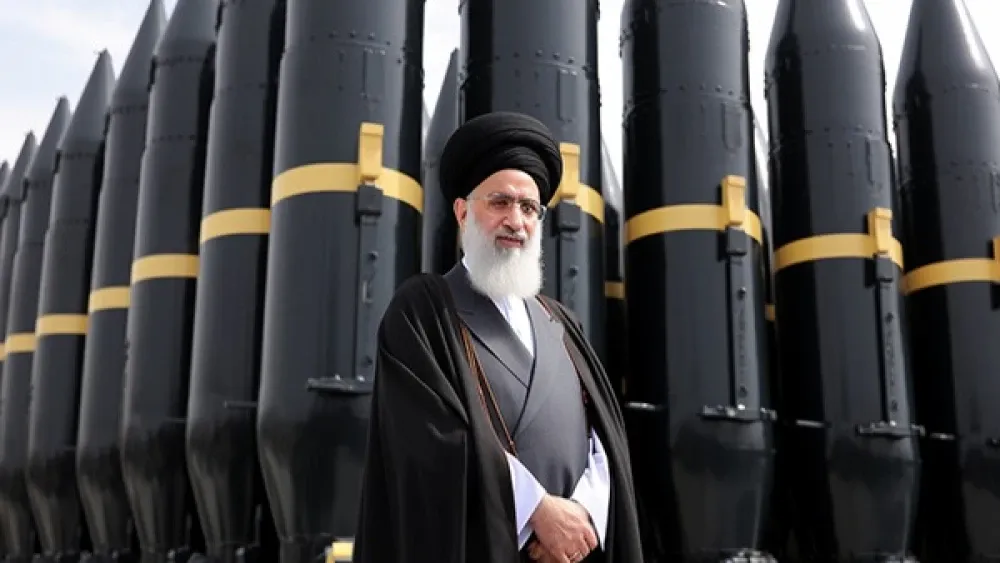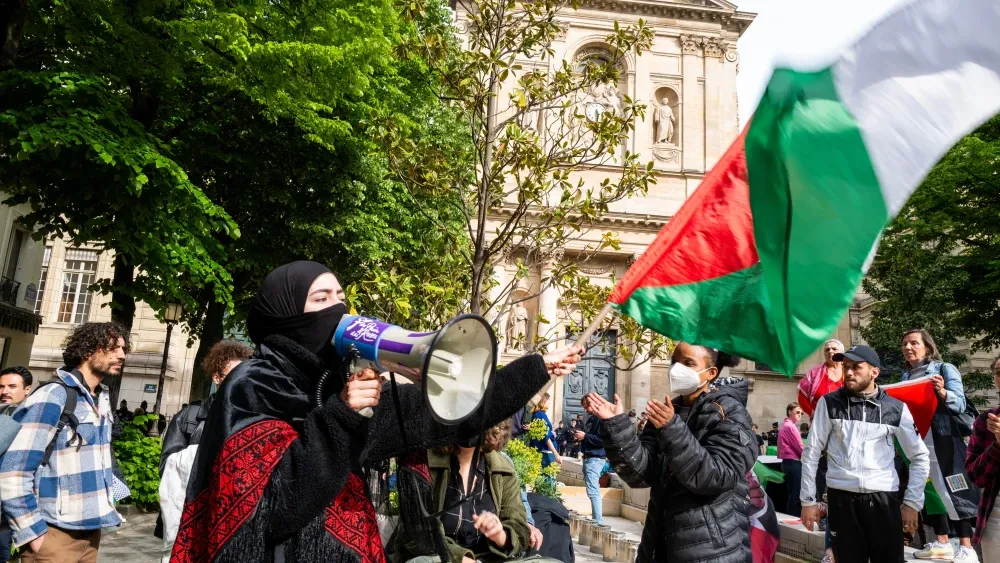| ||
 | ||
| Netanyahu's Strike Out, A New Strategy Against the Houthis, Debunking Anti-Israel Journalism, and Europe's Jewish Exodus By Ahnaf Kalam ● Apr 09, 2025 Smart Brevity® count: 5.5 mins...1500 words In this edition of the Dispatch, we dive into Israel’s Gaza contingency plans, Netanyahu’s D.C. trip, and the Houthi chokehold on Yemen’s aid. We also examine Lebanon’s need to chose its ambassador carefully, Cyprus-Egypt energy plays, a Spanish newspaper’s hit job on MEF, and Europe’s alarming Jewish exodus. | ||
ICYMI: Israel Insider with Ashley PerryIsrael is currently planning major ground operations in Gaza if Hamas does not agree to renewed negotiations in the coming weeks. What happens next? Ashley Perryis an advisor to the Middle East Forum’s Israel office. He served as adviser to Israel's minister of foreign affairs and deputy prime minister in 2009-15, and has also worked with Israel's Ministers of Intelligence, Agriculture and Rural Development, Energy, Water and Infrastructure, Defense, Tourism, Internal Security, and Immigrant Absorption and as an advisor to The Negev Forum. Originally from the U.K., he moved to Israel in 2001. He holds a B.A. from University College London and an M.A. from Reichman University (IDC Herzliya). To watch the full podcast episode, click here. | ||
After Softball Visit to Hungary, Netanyahu Strikes Out in D.C. Meeting with TrumpNetanyahu’s trip highlights Trump’s unconventional leadership, prioritizing U.S. trade goals and flexibility over allies like Israel, leaving Netanyahu exposed internationally and vulnerable at home amid ongoing crises. Why it matters: Netanyahu's attempt to strengthen ties with Hungary's Viktor Orban and sidestep ICC pressures was overshadowed by U.S. tariffs and unexpected diplomatic developments.
The big picture: Netanyahu's diplomatic strategy faced setbacks as Trump praised Turkey's Erdoğan, a harsh critic of Israel, complicating Israel's position.
What's next: Netanyahu returns to Israel facing domestic challenges, including ongoing corruption trials and public protests.
To read the full article, click here. | ||
It’s Time to End the Houthi Stranglehold over Humanitarian AidAmid “Signalgate” noise, the Houthis in Yemen remain a persistent threat, attacking civilian targets across the region and exploiting aid for power. Here’s what’s at stake and what Trump could do next. Houthis’ Reach: Beyond Israel, the Iran-backed group has hit Saudi Arabia and UAE infrastructure over 1,000 times while menacing global shipping lanes. Trump’s Move: Military strikes on Houthi leaders and supplies are underway, but experts say this is futile without choking off resupply via Sana’a airport, the Port of Hudaydah, and Oman’s weapons routes. Aid as a Weapon: Via their control of Hudaydah, the Houthis siphon humanitarian aid to fund their war, reward loyalists, and starve dissenters—a tactic preserved by the weak 2018 Stockholm Agreement.
Bottom Line: The Houthis thrive on aid and access. Trump has a chance to cut both off, but it will take bold moves against U.N. inertia and Houthi propaganda. To read the full article, click here. | ||
Will Lebanon Insult Donald Trump with a Pro-Hezbollah Ambassador?With Hezbollah’s fall reshaping the Middle East, Lebanon’s President Joseph Aoun faces a pivotal choice in naming a new ambassador to Washington—one that could make or break ties with the Trump administration. Aoun’s Strong Start: He appointed Karim Souaid, an anti-Hezbollah banker, as Central Bank governor, resisting PM Nawaf Salam’s questionable pick.
Diplomatic Stakes: Lebanon’s past ambassadors, like Farid Abboud (1999-2007), often fronted for Syria and Hezbollah, alienating the U.S. post-9/11.
The Right Fit: Aoun must pick someone with proven ethics and a consistent record of opposing Hezbollah—not opportunists who cozied up to the group for personal gain.
Bottom Line: Hezbollah’s defeat opens a rare window for Lebanon to align with Washington, but only if Aoun sends a staunchly anti-Hezbollah envoy, as anything less could signal weakness Trump won’t tolerate. To read the full article, click here. | ||
Why Cyprus-Egypt Energy Cooperation Benefits the United StatesThe energy agreements between Cyprus and Egypt offer the United States a strategic opportunity to counter Turkey, Russia, and China in the Eastern Mediterranean. The Agreements: These pacts involve developing the Aphrodite gas field and Block 6 of Cyprus’s exclusive economic zone, with Egypt processing Cypriot gas for export through LNG terminals.
Turkey’s Pushback: Turkey denies Cyprus’s legal maritime zones and disrupts drilling operations with naval forces.
Strategic Wins: The partnership enhances Europe’s energy security, reduces Turkey’s regional influence, and limits China’s economic expansion.
U.S. To-Do List: The United States should support these efforts with diplomatic backing, security commitments, and investment in LNG infrastructure.
Bottom Line: The Trump administration must view these deals as strategic priorities—endorsing them secures U.S. influence and energy stability, while failing to act could cede control of the Mediterranean to adversaries. To read the full article, click here. | ||
From ‘Inquisition’ to ‘Crucifixion': Debunking El País’s Anti-Israel Narrative on U.S. CampusesJournalist María Antonia Sánchez-Vallejo of the prominent Spanish newspaper El País accuses MEF of leading an “inquisition” against pro-Hamas academics, but Gregg Roman fires back, dismantling her smear of MEF and anti-Israel spin. The Accusation: Sánchez-Vallejo claims MEF triggered arrests like that of Badar Khan Suri by exposing his Hamas ties via his wife’s family.
‘Inquisition’ Hype: She also paints MEF’s public research—using open-source data like tweets and statements—as “doxxing” and persecution.
Student ‘Crucifixion’: Sánchez-Vallejo says foreign students face unfair arrests and job loss, citing such cases as a professor fired for removing hostage posters.
Trump Tie-In: She links MEF to Trump and Rubio in a grand conspiracy against dissent.
Bottom Line: Sánchez-Vallejo’s dramatic narrative flops—MEF’s mission isn’t persecution but exposing terror sympathies, and her loaded terms reveal more bias than evidence. To read the full article, click here. | ||
The New Jewish Fear and Exile from EuropeViolent attacks, most by Islamists, and societal shifts driven by uncontrolled immigration from Muslim-majority countries are driving Jews out of Europe, signaling a continent surrendering to antisemitism. The Attacks: A rabbi in Orléans, France, is assaulted, while a Jewish woman in Copenhagen’s Christiania is choked for carrying an Israeli flag. In London, an Israeli Jew is kidnapped and beaten by Islamists.
Mass Exodus: The European Jewish Association reports 40,000 Jews have left Europe since 2025, with 57 percent of Jews considering leaving. Leaders warn half of Jewish communities may vanish in a few years.
Bottom Line: Europe’s failure to curb antisemitism—fueled by Islamist extremism and apathy—risks a Judenrein future, with Jews as the first victims of a broader unraveling of European civilization. To read the full article, click here. | ||
Further Reading:
| ||
| That’s a wrap for this MEF Dispatch. From Trump’s tariff curveball and Iran talks blindsiding Netanyahu to Lebanon’s anti-Hezbollah tightrope and Cyprus countering Turkey, the region’s fault lines are shifting fast. Add in the Houthi aid racket, U.S. campus controversies, and 40,000 Jews fleeing Europe, and the stakes couldn’t be higher. Keep your eyes peeled for the next edition to stay abreast of these issues and more. | ||
| Was this edition useful? Your email will be recorded and shared with the sender | ||
| Powered by | ||
| ||









